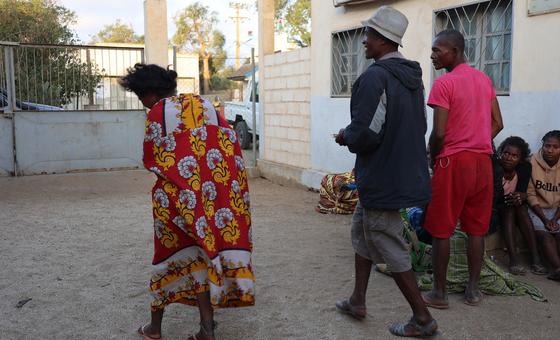Henrielle Emasignavy works for WHO in Ambovombe, where the Androy Regional Referral Hospital is based. She spoke about the care that is being provided to people who are struggling with mental health crises.

WHO’s Henrielle Emasignavy at the Androy Regional Referral Hospital.
“In Ambovombe town, we are seeing a number of mental health conditions, including psychotic episodes, schizophrenia and depression.
There has been an increase in young people suffering from mental health episodes. We think that amongst young men it may be linked to cannabis use, and amongst young women between the ages of 13 and 18, it could be the breakup of a relationship or depression following the birth of a child.
One of the contributing causes for both men and women is the anxiety of constantly living under stressful conditions caused by the ongoing humanitarian crises in the south of Madagascar.
We have recently experienced drought and cyclones in different regions of the south which have compounded the effects of climate change as well as deep-rooted underdevelopment. This has left the many vulnerable people who live across the south struggling to survive. When crops fail, they have no safety net and often go hungry. Access to health and other social protection services can also be problematic.
‘Victims of sorcery’
I met one woman called Elodie who suffered postpartum psychosis after giving birth at age 20 and then losing her child six months later.
When I met her, I noticed a chain had been attached to her ankle.
Her mother told me that it was for her own safety as her daughter kept on trying to escape. There is a lot of stigma attached to people who suffer from mental health disorders. They are said to be “possessed” and the victims of sorcery.
Mental health problems are curable from a medical point of view, but increasing ignorance and poverty force people to resort to drastic measures such as tying up patients, which exacerbates the mental illnesses they suffer from.

The mother (centre) of Elodie (right) says she has responded well to medication.
Accessing care
Accessing treatment is hugely challenging for patients. The nearest specialist hospital for mental health treatment is between 600 kilometres away, so to meet the increased need for services, WHO has brought in medical teams for periodic out-patient care.
During one three-day period, there was a total of 93 free consultations; 67 per cent of those patients were women, including Elodie, who was seen by a neurologist. As a result of this consultation, she was given medication which her mother says is improving the state of her mental health. Elodie is looking after herself better; for example, she is taking care of her personal hygiene.
WHO would like there to be more services available for people like Elodie, and while it is clear that a visiting psychiatrist can only do so much, I’m happy that we are able to help some patients on the road to recovery.
Elodie has the support of her mother and sister, but very sadly, the rest of the family rejected her and so she and her mother were forced out of the family home.
Her mother is hoping for a full recovery soon so Elodie can lead a normal life once again and so she can earn some money and contribute to the three-woman household.”
- Promote mental health and wellbeing and strengthen the prevention and treatment of substance abuse
- Reduce the number of deaths and illnesses from pollution, contamination and tobacco
- Achieve universal health coverage, and provide access to affordable, essential vaccines and medicines
- Reduce global maternal mortality rate to less than 70 per 100,000 live births and under-five mortality to at least 25 per 1,000 live births
- End epidemics of AIDS, tuberculosis and malaria and combat hepatitis and other communicable diseases
Sustainable development hinges on ensuring healthy lives and promoting wellbeing at all ages

